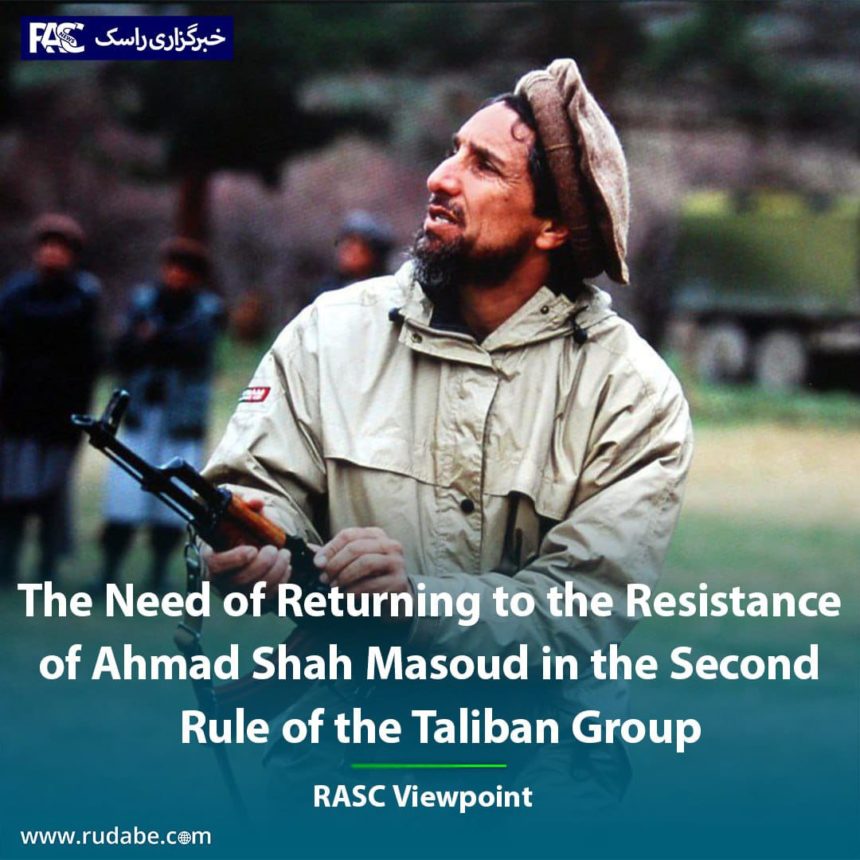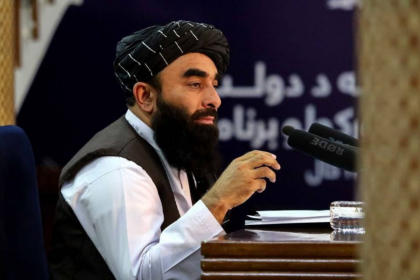Ahmad Shah Masoud’s life as a military commander and a politician can be classified in several stages: Firstly, he was a Jihadi and was not much different from other Jihadis of that time. This period continued until the fall of the People Democratic Political Party. The power fell into the hands of Jihadi groups, with Ahmed Shah Masoud being one of the Jihadist commanders.
From this period onwards, Ahmad Shah Masoud emerged as a political figure in the government of Burhanuddin Rabbani, because he had the political position of the Ministry of Defense in this government. The second period of the political and military life of Ahmad Shah Masoud began with the civil wars between the Mujahideen groups (which fought in alignment with the People’s Democratic Political Party of Russians). However, these Jihadi groups did not win the war against each other and remained involved in the war and did not reach a dialogue, until the Taliban entered the field as a radical Jihadi group and drove all the Jihadi groups out of Kabul.
The third period of Ahmad Shah Masoud’s life as a resistance commander and a prominent politician began with the emergence of the Taliban. During this period, many Jihadi leaders fled Afghanistan and went abroad, but Ahmad Shah Masoud stayed in Panjshir and controlled a part of Afghanistan that included Panjshir, parts of Kapisa, Takhar, etc. At this time, Masoud declared resistance, as an expert politician entered into a dialogue with the countries of the world, went to France, and gave a speech, whose speech and character were welcomed by the world community. Most importantly, he was able to expose the face of the Taliban as an extremist group and made the international community aware of the danger of the Taliban.
What Ahmad Shah Masoud had said about the Taliban at that time came true. At the beginning, the Taliban broke the Bamyan Buddha and they participated in terrorist attacks in countries around the world with Al-Qaeda and other extremist groups. As well as, they supported Osama Bin Laden in collaboration with Al-Qaeda and they attacked the Twin towers in America.
The question is why Ahmad Shah Masoud did not reached to an agreement with the Taliban?
While the Taliban claimed Jihad and the realization of the Islamic government and Ahmad Shah Masoud had started his Jihad, not specifically against the Russians, before the arrival of the Russians, even from the end of Zahir’s rule and the beginning of Dawood’s rule. Ahmad Shah Masoud had changed in terms of political thought and thought from the period when he started Jihad to the emergence of the Taliban, because during this time he was involved in the problems of Afghanistan and wanted the problems of Afghanistan to be solved realistically.
Perhaps, at the beginning of the Jihad and until the fall of the People’s Democratic Political Party, he thought that the problem of Afghanistan would be solved with Islam and the Islamic government. But when he entered Kabul with Jihadi groups, all of these Jihadi groups attacked Islam and Islamism more than others, not only they could not solve the problem of Afghanistan, but the Jihadi groups themselves became a problem on top of Afghanistan’s problems.
Ahmad Shah Masoud remained faithful to Islam until the end; so why didn’t he interact with the Taliban? While the Taliban were Hanafi and Ahmad Shah Masoud was also Hanafi. However, the fact is that Ahmad Shah Masoud, due to his conflict with the problems of Afghanistan and the precision he had to solve these problems, had realized the origin of the basic problems of Afghanistan. As well as, these problems were ethnic and lingual, because a nation wanted its ethnic domination in different ways and under the name of Nader Monarchy, to impose the appearance under the name of Dawood Republic, under the name of Turkish communism, Hafiz and Najib Communism and under the name of the Islamic Emirate of the Taliban on the Tajik, Hazara and Uzbek peoples of Afghanistan and spread their tribal and primitive lingual and customs in Afghanistan.
Ahmad Shah Masoud noticed this ethnic and lingual dominance in Afghanistan and accepted that this dominance in power, political system and culture is one of the basic problems of Afghanistan. Otherwise, Ahmad Shah Masoud, as a Hanafi Jihadi, could have interacted and talked with the Taliban, who presented themselves as a Hanafi jihadi group. Nevertheless, Ahmad Shah Masoud did not enter into interaction with the Taliban group, but entered into interaction and dialogue with the Jihadi groups that were fighting each other until the Taliban got the country dominance. Because Ahmad Shah Masoud knew that the Taliban are an ethnic group, they do not consider Tajiks or any ethnic group as their partner in power, rather the Taliban want to seize the land of the Tajik, Hazara and Uzbek ethnic groups and impose their ethnic rule.
Therefore, Ahmad Shah Masoud understood that by describing any differences with the Hazara and Uzbek Jihadi groups, it is possible to deal with these groups, because the interests of these groups are common, and the Taliban ethnic group seeks to remove all these groups from the scene. As a result, Tajik, Hazara and Uzbeks become subjects of the Taliban ethnic government and the ethnic monarchy of the Pashtun people continues under the name of the Islamic Emirate.
Ahmad Shah Masoud was a realist politician who saw the problem of Afghanistan based on the reality of the ethnic problem and the domination of one tribe over other tribes of Afghanistan. Accordingly, he chose to resist against the Taliban by understanding any danger. The goal of Ahmad Shah Masoud’s resistance was not only resistance against a religious extremist group, but also resistance against an ethnic extremist group that wore the clothes of monarchy, republic, communism, and Islam according to the circumstances and situation, but the goal of this ethnic group was ethnic domination on the non-Pashtun tribes of Afghanistan in any cases. Ahmad Shah Masoud’s resistance in this period was clearly resistance against the ethnic rule of the Taliban group.
The fact is that Afghanistan is facing the same problem with the re-emergence of the Taliban in this period that it faced during the resistance period of Ahmad Shah Masoud. Because the Taliban have not changed; as in the previous period, they banned women’s education and employment, sought to eliminate the Persian language, invaded and occupied Tajik, Hazara, and Uzbek lands, and relocated Pashtun people from Pakistan to make the Pashtun majority in Afghanistan in Tajik, Uzbek, and Hazara areas.
Based on this, we understand that Ahmad Shah Masoud’s understanding and recognition of the Taliban was correct, although at that time, the Taliban were inexperienced and less known, and it was thought that the Taliban group was a Jihadist and religious group, but Ahmad Shah Masoud already knew this group. He knew that they are an ethnic group that wants to dominate and do not intend to participate politically in power and form a government based on elections with the Afghanistan people, especially the Tajik, Hazara and Uzbek people.
Therefore, it is necessary to return to the political view and resistance of Ahmad Shah Masoud against the Taliban. Ahmad Shah Masoud considered the Taliban a problem for Afghanistan and the world. Today, the Taliban is a problem for Afghanistan, the countries of the region and the world. Not only the people of Afghanistan, the countries of the region and the world also need to return to the politics and resistance of Ahmad Shah Masoud against the Taliban and consider the Taliban as a threat and a danger to themselves.






